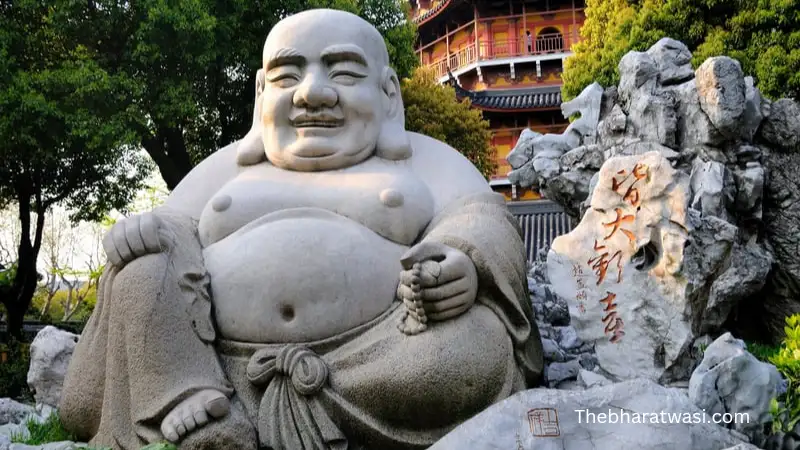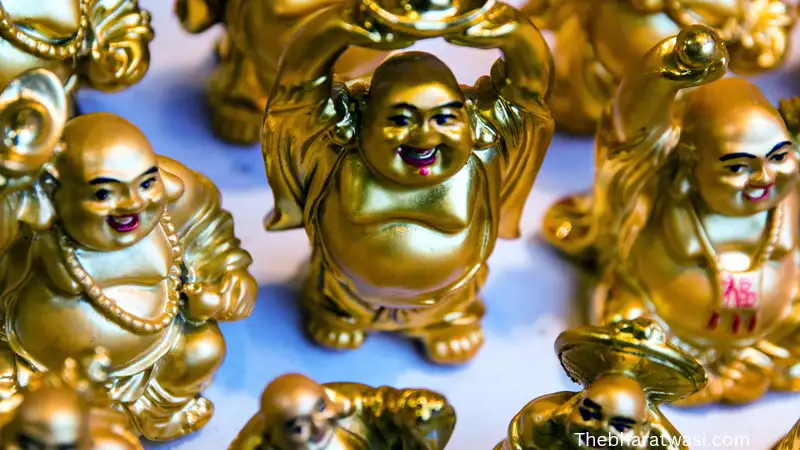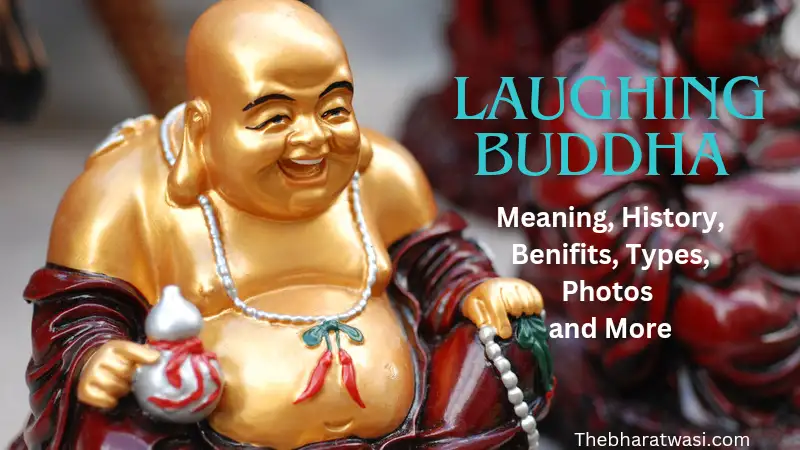The Laughing Buddha, a statue frequently shown with a cheerful demeanor and a big, round belly. He has evolved into a global representation of happiness and success. He’s universally recognizable, iconic character bridges cultural divides and spreads. He gives Joy to all who come into contact with him.
The Laughing Buddha originated in ancient Chinese Buddhism where he is known as Budai or Hotei. Buddha’s story is one of generosity, Kindness and a search for enlightenment. The story of Laughing Buddha becoming a symbol of good luck and happiness from an ordinary monk is very interesting in itself.
Laughing Buddha Meaning
The Laughing Buddha is a symbol of plenty and contentment because of his upbeat temperament and frequent presence of a bag laden with goodies on shoulder. Any environment he is in is said to benefit from his luck, wealth, and positive energy.

We will examine the Buddha’s rich past, the symbolism underlying his likeness, and his ongoing impact on diverse civilizations in this investigation. This article will reveal the mysterious allure of the Laughing Buddha, whether you’re interested in learning about the cultural significance of this renowned figure or how his teachings adhere to Buddhist ideals. Come us on a journey as we uncover the rich legacy of a symbol that has a history of bringing happiness and kindness to people all around the world.
READ MORE : Diwali 2023 Date And Puja Time : Unveiling the Schedule of this 5-Day Celebration
Laughing Buddha History and Story
Laughing Buddha’s Real Name – Budai/Hotei
The Laughing Buddha, also known as Budai or Hotei, has a mysterious past that is just as mysterious as his glowing grin. His tale began in ancient Chinese Buddhism, which left a lasting impression on cultures all over the world, and may be traced back to his origins.
A chubby and joyful monk named Budai lived in China’s Liang Dynasty (907–923 AD). His upbeat demeanor and kind heart made him a favorite with everyone he encountered. He was renowned for dispersing happiness and kindness by donating his material possessions to those in need.
The frequently portrayed treasure bag in Budai’s iconography represents his willingness to distribute his fortune to others. Additionally, this bag has a powerful message: it stands for the limitless supply of spiritual wealth. Budai’s teachings focused on living a simple, harmonious existence while also encouraging giving and inner contentment.

Budai’s legacy eventually spread outside of China to Japan and other Asian nations. He began to be associated with success and happiness. He became a beloved character in many cultures due to his position as a defender of children, travelers, and the underprivileged.
Laughing Buddha Statue: In essence, the history of the Laughing Buddha is a monument to the resilience of compassion, contentment, and selflessness. Millions of people are still motivated by his image, which serves as a reminder that genuine riches is found not just in worldly belongings but also in the depth of the heart and spirit.
FENGSHUI LAUGHING BUDDHA STATUE FOR HOME
Laughing Buddha Benifits in Your Life
The Laughing Buddha, with his jovial countenance and rotund belly, has long been regarded as a symbol of positivity and well-being. Beyond his charming appearance, the Laughing Buddha Vastu offers a lot of benefits, both in a spiritual and practical sense.
- Attraction of Good Fortune: According to Chinese folklore, the Laughing Buddha is a harbinger of prosperity and good fortune. Having an image or statue of the Laughing Buddha in your home or workplace is believed to usher in blessings and abundance.
- Dispelling Negative Energy: The Laughing Buddha is known for his ability to ward off negative energies and promote a sense of calm. Many people believe that his presence can create a protective shield against harmful influences.
- Promoting Joy and Positivity: Just gazing upon the Laughing Buddha’s infectious smile can lift your spirits and bring joy to your heart. His presence serves as a reminder to approach life with a lighter, more optimistic attitude.
- Encouraging Generosity: The Laughing Buddha’s act of giving is a testament to the power of generosity. By adopting his philosophy, you can cultivate a more generous spirit, helping those in need and experiencing the profound satisfaction of giving.
- Attracting Success and Abundance: The Laughing Buddha’s bag of wealth symbolizes abundance and the endless treasures of life. Placing importance on inner riches rather than material possessions can attract success and fulfillment.
- Stress Reduction: The Laughing Buddha’s tranquil expression can serve as a reminder to let go of stress and worries. His presence can be a soothing influence in today’s fast-paced world.
Incorporating the Laughing Buddha into your life, whether through Laughing Buddha statues, images, or teachings, can bring about these benefits, creating a more harmonious and joyous existence. It’s a timeless reminder that happiness, generosity, and contentment are among life’s greatest treasures.
READ MORE : Bageshwar Dham Address, Location, Contact Number,Best Route, Story, Guruji Name and Complete Information
Type of Laughing Buddha and their Meaning
Here are some of the most prominent types of Laughing Buddha and their Meanings :

- Wealth Buddha: This Laughing Buddha variant is often depicted with a sack or a bowl. It represents wealth, abundance, and prosperity. Many believe that placing a Wealth Buddha in your home or office can attract financial well-being.
- Longevity Buddha: This Laughing Buddha, usually seen holding a gourd or a staff, symbolizes health, longevity, and contentment. It is a popular choice for those seeking blessings for a long and healthy life.
- Love Buddha: The Love Buddha, with a heart symbol in hand, signifies love, happiness, and romance. Placing this Buddha in your home may attract love and strengthen existing relationships.
- Travel Buddha: The Travel Buddha, carrying a sack and a walking stick, encourages travel and adventure. It’s a favored choice for wanderlust-filled souls who seek safe journeys and exciting experiences.
- Happiness Buddha: The standard Laughing Buddha with a joyful, round face is simply a beacon of happiness, joy, and good fortune. It is often placed at the entrance of homes to bring a sense of well-being to all who enter.
- Wishing Buddha: This Laughing Buddha carries an ingot or a string of coins, representing a fulfillment of wishes and dreams. Many people believe that this variant can make your dreams come true.
Each type of Laughing Buddha serves as a reminder of the values and aspirations they represent. You can choose the one that resonates with your life’s desires and goals.
READ Other Post : Top 20 Money Plant Benefits
FAQ’s Related Laughing Buddha :
1. What is the significance of the Laughing Buddha’s different poses?
The Laughing Buddha’s various poses represent different aspects of life, such as wealth, happiness, love, and protection. For example, a Laughing Buddha with a fan symbolizes happiness and joy, while one with a wealth bag represents wealth and prosperity.
2. Is it necessary to have a specific type of Laughing Buddha for different purposes?
While not necessary, choosing a Laughing Buddha with a pose that resonates with your specific goals can enhance the positive energies it brings. For example, if you seek wealth, a Laughing Buddha with a wealth bag would be a suitable choice.
3. Can anyone place a Laughing Buddha in their home or workplace?
Yes, the Laughing Buddha is generally considered a symbol of positivity and happiness. It can be placed in homes, workplaces, or any other spaces to invite good fortune and joy.
4. What is the history behind the Laughing Buddha’s origin?
The Laughing Buddha, originally known as Budai or Hotei in China, was a Zen monk who lived in the 10th century. He was renowned for his benevolent nature and contagious laughter, which led to his association with happiness and good fortune.
Visit The BharatWasi Homepage for latest relatable Posts.

![Best 50 Happy Diwali Wishes in English [Quotes, Greetings, Instagram Captions] Happy Diwali Wishes, Quotes, Greetings, Captions in English](https://thebharatwasi.com/wp-content/uploads/2023/11/Happy-Diwali-wishes-Greetings-Quote-In-English-150x150.webp)




